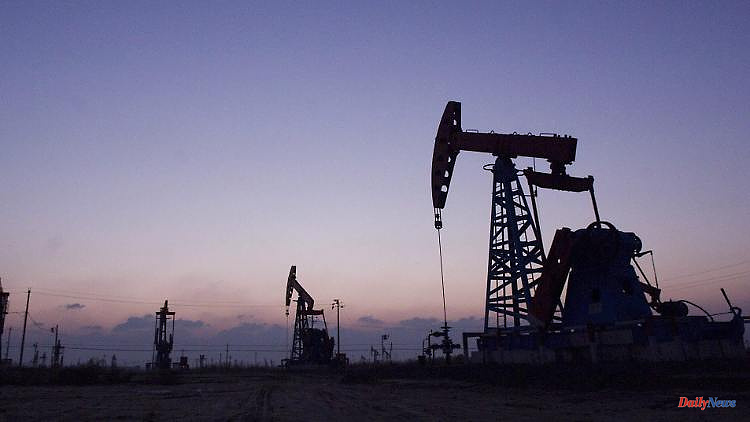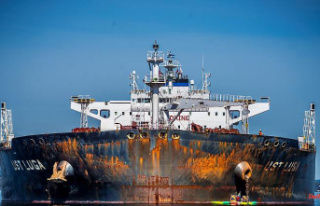Economics Minister Habeck wants countries that consume a lot of oil to join forces when it comes to purchasing. They could use it to form a counter-Opec. "In principle, the idea is not bad," says competition economist Justus Haucap in an interview.
Economics Minister Robert Habeck surprised many economists with the idea of an oil demand cartel. Member states should form a kind of counterweight to OPEC, the powerful association of oil-producing countries. This could set upper price limits and reduce Russian war revenue. Is this a good idea?
Justus Haucap: Mr. Habeck has not yet specified exactly what he means by that. In principle, the idea is not bad. This is a common response we propose in markets with supply power. If you can't stop supply power like this, it's best to create some kind of countervailing power.
Is it really impossible to stop this supply power? Wouldn't it be the first economic reflex to weaken Opec instead of building your own cartel?
That is of course the first consideration and would certainly be the best solution on paper. However, since OPEC is an association of several states, the cartel cannot simply be dismantled. If OPEC were made up of companies, they would be subject to antitrust laws. But it happens to be made up of states, and that is the real political dilemma here. So you have to look for alternatives and a standard suggestion is to form countervailing forces.
Are there any examples where this works?
A classic example is the labor market. There are employers' and workers' associations. This is also not unusual in other markets, for example when you think of purchasing groups that deal with large manufacturers. So it makes sense to say: Why don't the oil-importing countries join forces and act as one in negotiations with OPEC? As pure price takers, they are currently not playing any countervailing power at all.
How do you build a cartel like that?
Of course, the devil is in the details. But it is very important to get enough countries together. It would certainly be good if at least the EU took a united stance on this. My naïve expectation would be that this would work because we are, by and large, an importing country.
Hungary is already getting in the way...
Yes, but that might be for strategic reasons. They probably want to enforce some claim.
... allegedly it is about 25 billion euros in compensation for an oil embargo against Russia ...
Yes, but if you say to Hungary now: Watch out, we're setting up a counterbalance to Opec here and that's supposed to make our oil cheaper - then I can't believe that Hungary doesn't want that. Viktor Orbán also has nothing to do with high oil prices.
Who would lead such a cartel?
That would have to be sensibly managed by the states, just as OPEC is also run by the states. When it comes to the details, you would then have to think: should the topic be settled within the EU, for example in the area of trade policy? Or do you build an independent organization, such as OPEC, to which other countries could then also join. That would of course make the organization even more powerful.
How effective would such an organization be compared to OPEC?
That's not an easy question to answer. For example, we see that OPEC is only half stable. The organizational structure is there, it's stable. But first, not all oil-exporting countries are in OPEC, and second, there are cartel outsiders there. A cartel is always political. The political situation in Saudi Arabia, for example, is very different from that in Venezuela. In concrete terms, this means that if Venezuela needs money, for example, then they have a completely different interest than the rest of the association. In reality, we often see this when a country fails to adhere to the agreed production volume. However, given the variety of member states, such agreements are not trivial.
Does that mean that a demand cartel should only consist of countries that are as homogeneous as possible?
Of course, when interests differ, it complicates negotiations and weakens the organization. But the question of how do we set something up is exactly right. I think we should think this through carefully and not pull something off in a hurry.
Does it even make sense to form such an organization without important importing countries like China or India? Economic theory predicts that India and China will then pay more and be served first. That would exacerbate the supply bottleneck for the cartel...
You have to gather a certain crowd behind you, otherwise it's pointless. Just Germany and France together, for example, would be too small for the entire oil market. But if you manage to get the entire EU behind you, that would be different. Europe is already important enough for oil imports that prices could be influenced - even without China and India. It is obvious that the EU is a starting point here and then makes the organization open.
The US has also been open to the idea...
Yes, but the US is also relatively self-sufficient and could supply itself with oil. The fact that other countries are currently driving oil prices up is not in the interests of the USA anyway. When oil prices are high, it slows the global economy and thus US growth. So the statements don't surprise me.
And yet: If China and India are not there, that should weaken the organization considerably, right?
That's so. It will then always be an option for Opec: Do we prefer to sell to India or China? But, and one thing to remember, the Chinese have no interest in paying more for oil than the cartel. So they will be guided by these prices. In economics, we then speak of price umbrella effects. Even those who are not involved in the cartel benefit from it. Nevertheless, it remains true that a cartel is more effective the more countries participate.
Suppose the states have agreed on such a cartel. How does that work operationally?
First of all, the states would have to make supra-regional agreements that clarify responsibilities. Then the cartel could enter into negotiations with OPEC and, for example, push through production volumes at certain price schemes. From here, my suggestion would be that things continue as before - that is, that direct business transactions are handled by the companies. We also have other markets where there are trading restrictions. But that does not mean that the state itself acts as a buyer.
What should mineral oil companies consider?
Actually, not much will change for the companies. You buy the quantities normally from the producer, only on the negotiated terms. It's a bit like on the labor market: the employers' and employees' associations negotiate the collective agreements. However, the company concludes the employment contract with its employees. In this sense, the business transaction is a matter for the company.
In a way, Robert Habeck wants to kill two birds with one stone. He wants to lower the prices at German gas stations and at the same time reduce Russian income through the lower world market price for oil. Can this work?
The poorer countries will of course pay close attention to the costs. If they continue to get oil cheaper in Russia, then they will continue to buy there. But: Robert Habeck's logic is therefore not wrong. If the world market price were to fall as a result of a demand cartel, then Russia would also have to grant a larger discount. Then their price also falls, which in turn reduces income. In this respect the approach is correct.
Jannik Tillar spoke to Justus Haucap.
The interview first appeared on "Capital".












